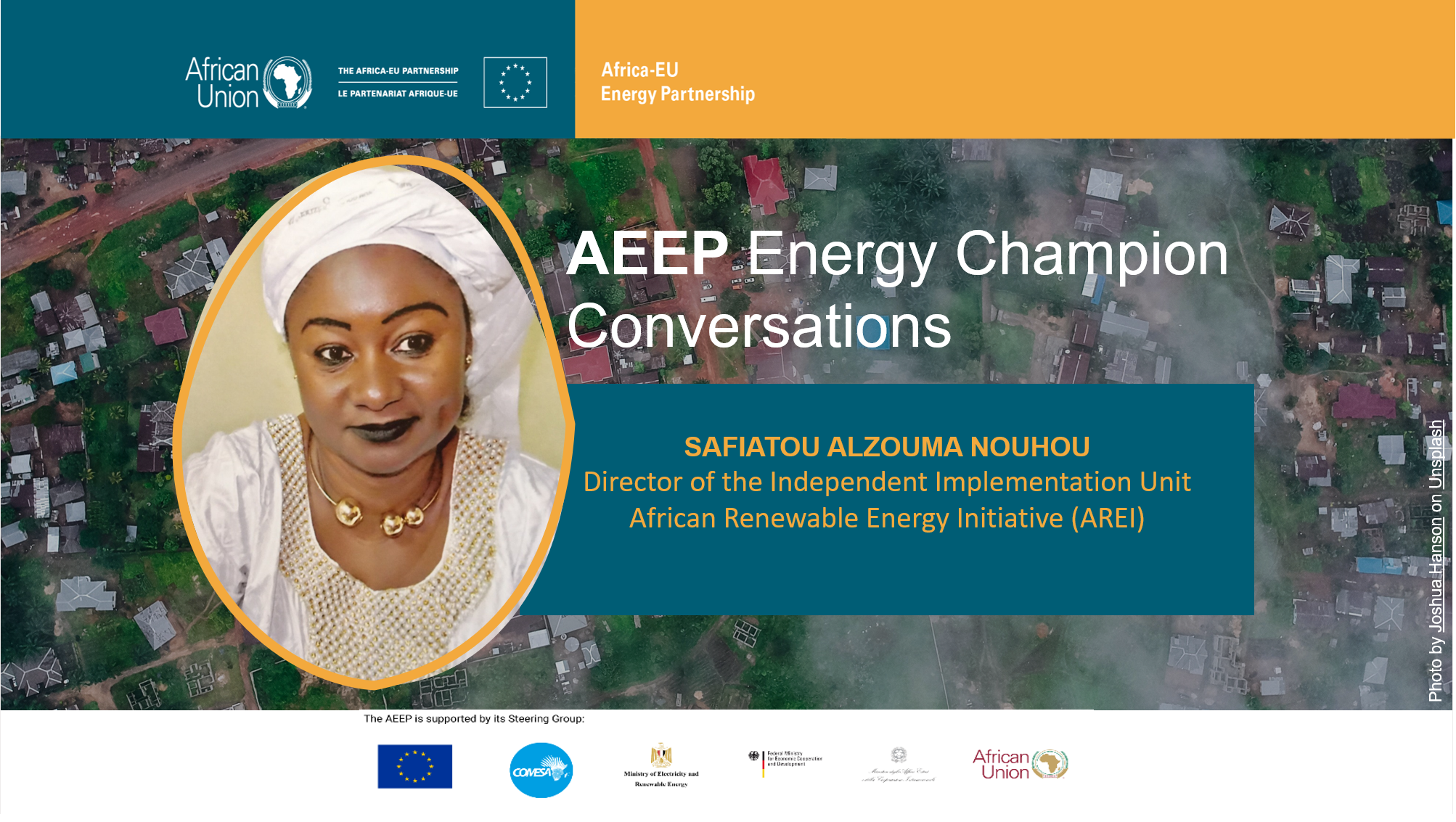AEEP Energy Champion Conversations: Safiatou Alzouma Nouhou

The AEEP Energy Champion Conversations is a series of interviews that highlight the work of inspirational energy experts in Africa and Europe. We meet passionate promoters of a sustainable energy transition and hear their insights on the biggest achievements so far and most pressing challenges ahead.
Universal access to clean, appropriate and affordable energy is a prerequisite for well-being and economic development as envisioned by the UN 2030 Agenda for Sustainable Development, the UN Paris Agreement on Climate Change, the African Union’s Agenda 2063 and the EU’s Comprehensive Strategy with Africa.
As the gateway for joint action on a green energy future, the Africa-EU Energy Partnership (AEEP), in this series accentuates visions of key energy actors on how to achieve universal access to affordable, sustainable and modern energy services in Africa.
SAFIATOU ALZOUMA NOUHOU, Director of the Independent Implementation Unit, African Renewable Energy Initiative (AREI)
1. When, how and why did you start to work for a sustainable energy future?
I’m a product of the energy sector. I started working in this sector as a result of a combination of two factors. In the beginning it was a challenge, because when I was a teenager, there were all these stereotypes around me that girls must go for an educational profile that fits a girl. The technical ones were exclusive for boys. I wanted to break that state of mind. Then, after my graduation, when I started my professional life, I realised that there is a huge gap on my continent both in terms of sufficient quantity and quality of energy, while energy is so vital for all of us.
2. Tell us about some of the most successful steps that you have been involved in so far to achieve sustainable, affordable and modern energy for all in Africa?
The list is really long! I have been involved in so much, everything from the development and design of policies for modern energy services to monitoring of implementation of policy and strategy. The most important thing in my view are the multisectoral energy committees I worked on in 2006-2008. Through this work we were able to bring together many different players who previously did not talk to each other and this way try to harmonise all their activities. This, in turn, enabled us to develop national programmes on energy. It was a very challenging task, but also a big achievement. At that time, globally, we did not talk about energy issues the way we talk about them today. At ECOWAS, we had, however, already worked with this regional approach and when the Sustainable Energy for All (SEforALL) was launched in 2011, for us at ECOWAS, it was only a continuation of the work we had already done.
3. Africa and Europe have an established and dedicated partnership on energy. What do you see as the particular strength of this partnership? If we had an initiative to intensify and accelerate that partnership’s impact, what would be your aspirations for such a framework?
The particular strength of the AEEP is the long-term strategic dialogue that it facilitates. Africa is a complex continent, when you move from one region to another, the mindsets and visions are very different. The AU is trying to harmonise this and the target of the partnership is really to look at the structures of it.
In terms of next steps, the aspirations to accelerate this partnership, I would say it should focus on the support for the local private sector in Africa. We need hundreds of billions to reach access to modern energy for all. For this, we need to have a very strong private sector. Governments are facing financial difficulties, so we need to get funds from the international commercial markets. We have successful examples on the continent that show why it is necessary to have that fully functioning private sector, together with risk mitigation, technical assistance and support for policy dialogue.
4. How do we ensure that the shift away from fossil fuels to sustainable energy solutions happens in a just way that includes even the most marginalised groups in society?
It is doable by adopting a colloquial and inclusive approach. To make the energy transition achievable, we must include all. If you look at the decisions that were made 15 years ago, the key players were only the public sector. We did not get too much input from the end users, but they are the most important link. They are the ones who use and should benefit from the energy. Unless we empower people and include them in everything from design to implementation, it will fail. But if we do it, people will feel ownership and understand the importance of the transition better.
5. What motivates you to keep pushing for a clean energy transition?
I get my motivation from two things, the lack of access to clean energy, it is incomprehensible for me how in the 21st century, we still do not have that, and secondly, the effects of climate change.
Firstly, when we talk about access, I come from the Sahel region, it is not an easy region and energy access is a big challenge not only there, but in many parts of the continent. As soon as you move to the suburban areas made up of a population who has migrated from rural areas, you will meet the traditional practices of generating energy, and in the evening, you are faced with darkness.
My second motivation, climate change, also relates to the Sahel region where we feel it, live it. Climate change impacts economic and social life. Let me give you an example, at the beginning and end of each rainy season, we face sandstorms, we did not have this phenomenon before, but this is our reality. To try to fulfil your energy needs, mainly for rural populations with limited means, in this environment, is a real challenge. Additionally, if you look at the usage of land, arable soil is drastically reduced and there is scarcity of water, which can create tensions between communities. This all adds up to insecurities in peoples’ lives. These are my personal experiences, it is not only something I read about in the papers, and this is why I keep pushing.
Ms Safiatou Alzouma Nouhou is the Director of the Independent Implementation Unit of the African Renewable Energy Initiative (AREI). Ms Nouhou has worked at the Ministry of Mines and Energy of Niger and been the National Director of Renewable Energies for five years. Before joining AREI, she worked as the Head of the Sub-Saharan Africa Region at the International Renewable Energy Agency (IRENA) in Abu Dhabi.
AREI works to accelerate, develop and exploit Africa’s vast renewable energy potential by supporting the development of transformation policies, the adoption of ambitious renewable energy targets. Additionally, AREI helps mobilise international public funding to lead these efforts.
Read the interview with Saliem Fakir.





